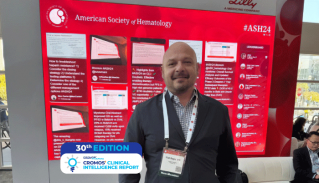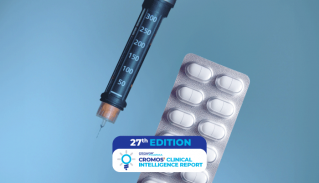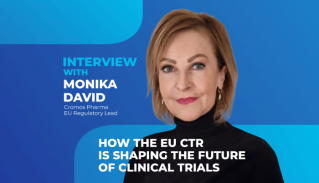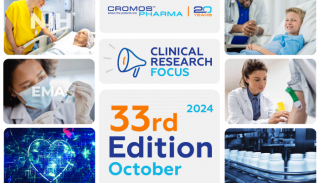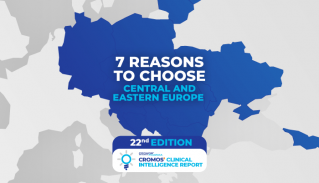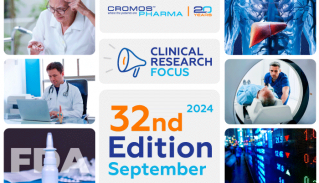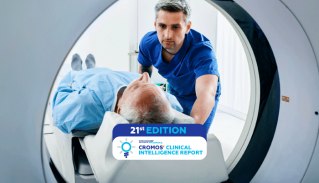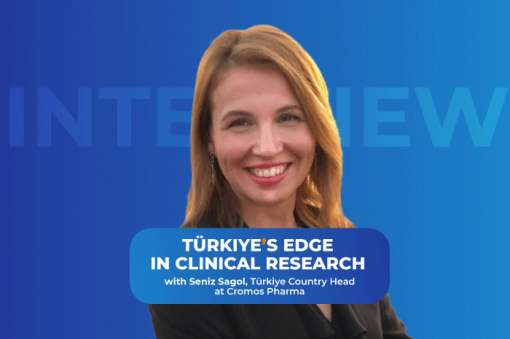
Exploring Türkiye’s Edge in Clinical Research: Insights into Hospital Systems and Regulatory Framework
Featuring Seniz Sagol, Türkiye Country Head at Cromos Pharma
The clinical research landscape in Türkiye is undergoing a dynamic transformation, offering a unique combination of opportunities and challenges for sponsors and stakeholders alike. With its well-established healthcare infrastructure, vast patient population, and a growing commitment to aligning with international standards, Türkiye is becoming an increasingly attractive destination for clinical trials. However, successfully navigating its regulatory landscape and hospital systems requires a nuanced understanding of the local environment.
In this engaging interview, Cromos Pharma’s Türkiye Country Head, Seniz Sagol, provides invaluable insights into clinical trials in Türkiye. The conversation delves into the nation’s hospital settings and regulatory processes, shedding light on how Türkiye is positioning itself as a competitive player in the global clinical research industry. The interview is conducted by Cromos Pharma’s Marketing Specialist, Lilit Tsaturian.
Lilit: Can you share insights into how clinical research is organized in Türkiye?
Seniz: Clinical research in Türkiye is regulated by the Ministry of Health (MoH) and the Turkish Medicines and Medical Devices Agency (TİTCK). Multiple stakeholders play essential roles at various stages of clinical research, and their collaboration is critical to ensuring high-quality trials.
Key players include clinical trial sites and investigators, who are responsible for conducting studies and providing care to patients. Their expertise and performance are vital to aligning Türkiye’s clinical trials with both national and global standards.
Clinical trials can be conducted across various settings, including university hospitals, city hospitals, private hospitals, training and research hospitals, and public hospitals. For multi-center trials, a National Coordinator is appointed, whose site may host a Clinical Research Ethics Committee. This committee acts as the Central Ethics Committee for the trial, streamlining approvals for all participating sites across Türkiye.
Lilit: How are healthcare institutions structured in Türkiye, and what types of hospitals are suitable for clinical research?
Seniz: Clinical trials are meticulously designed to safeguard volunteer safety, promote accurate research practices, and ensure the availability of adequate personnel, equipment, and facilities. Trials can take place in university-affiliated centers, approved research and development sites, and Ministry training hospitals. Ideally, these are institutions specifically equipped for clinical research.
Private hospitals and other healthcare facilities that meet the required standards can also participate, provided they operate under the coordination of designated centers. Türkiye boasts 933 public hospitals (including university, training, and city hospitals) and 572 private hospitals, offering a total of 266,564 beds—an exceptional capacity for supporting clinical research.
Lilit: It’s impressive to see such a variety of hospital types involved. How do these hospitals differ in terms of their role in clinical research?
Seniz: All hospitals operate under the Ministry of Health and adhere to uniform legislation, guidelines, and inspection standards. Their roles in clinical research vary:
- University Hospitals: These institutions, whether public or private, have the most experience in clinical trials. They are often involved in studies for complex or rare conditions and benefit from a global network of collaborations, attracting international trials and patient referrals.
- City Hospitals and Training Hospitals: These are the largest hospitals, offering significant patient volumes ideal for identifying eligible participants. They have unified systems for contract negotiation and feasibility assessments, making them efficient for clinical research.
- Private Hospitals: The number of clinical trials conducted here is rising. These hospitals are known for state-of-the-art facilities, streamlined contracting processes, and faster trial activation.
Lilit: Could you explain the organizational structures within these institutions?
Seniz: Clinical research institutions vary in their organizational structures:
- Clinical Trial Units: Staffed by dedicated professionals, these units handle feasibility assessments, site selection, and contract management.
- Clinical Trial Centers: Often specialized in fields such as oncology or neurology, these centers focus on smooth trial operations under the leadership of a Principal Investigator.
- Centers of Excellence or Clinical Trial Offices: These offices support investigators by managing administrative tasks, enabling physicians to focus on patient care and research quality.
Lilit: What about early-phase studies? Are they conducted in Türkiye?
Seniz: Yes, Phase 1 studies are conducted exclusively in MoH-approved Phase 1 Units. Currently, there are 13 such units and 8 Bioequivalence/Bioavailability Units in Türkiye. These facilities meet the stringent requirements of EMA and FDA inspections, ensuring high-quality research standards.
Lilit: How do sponsors identify sites for new studies, and what does the feasibility process entail?
Seniz: Although Türkiye currently lacks a central feasibility database, one is expected soon. For now, sponsors and CROs maintain their internal databases, while academic associations provide additional resources. The Ministry of Health also publishes clinical trial data to assist stakeholders in identifying experienced investigators and hospitals.
Cromos Pharma’s Expertise in Clinical Research in Türkiye
Cromos Pharma offers unparalleled expertise in guiding sponsors through the complexities of conducting clinical trials in Türkiye. With a deep understanding of its regulatory framework and healthcare landscape, Cromos Pharma supports site selection, ethics committee submissions, and regulatory approvals, ensuring seamless and compliant trial execution.
For more information on how Cromos Pharma can assist your clinical trial programs in Türkiye, contact us at inquiry@cromospharma.com. We are committed to advancing your research with excellence and compliance.










